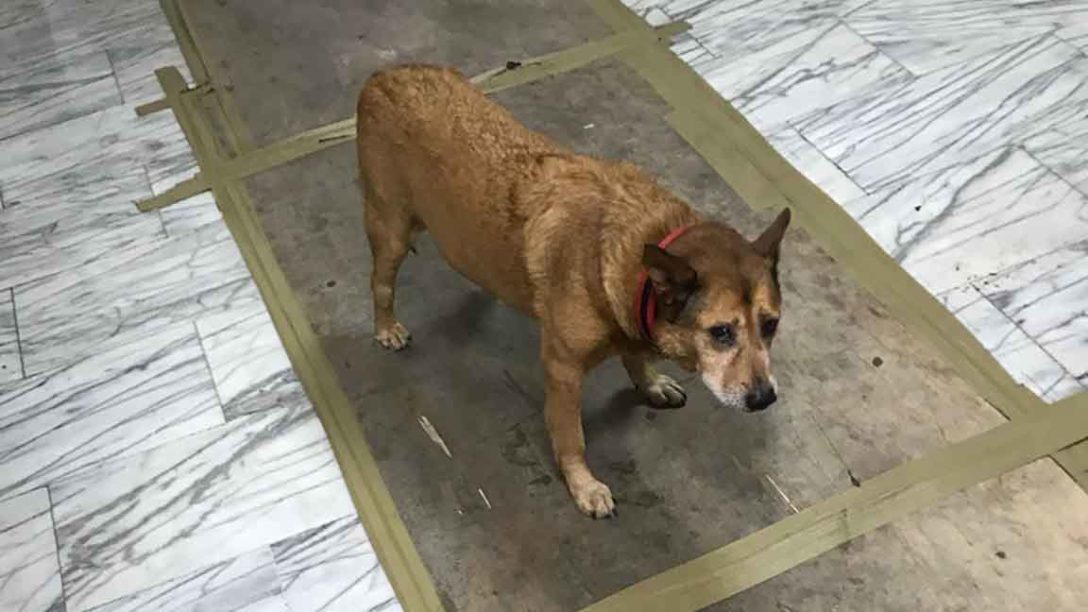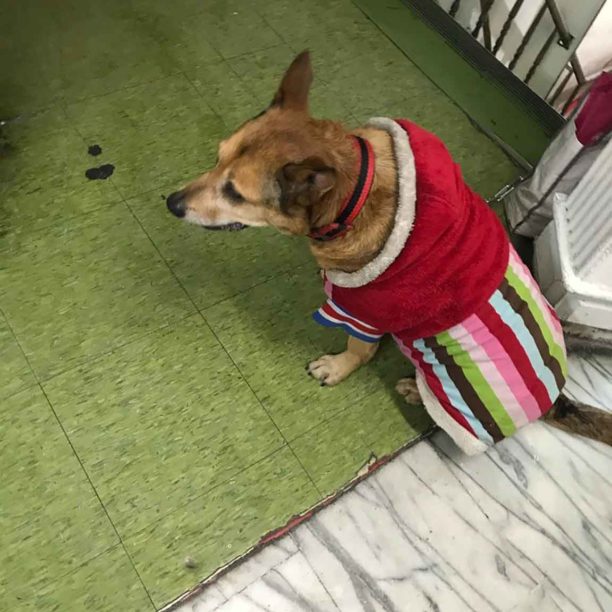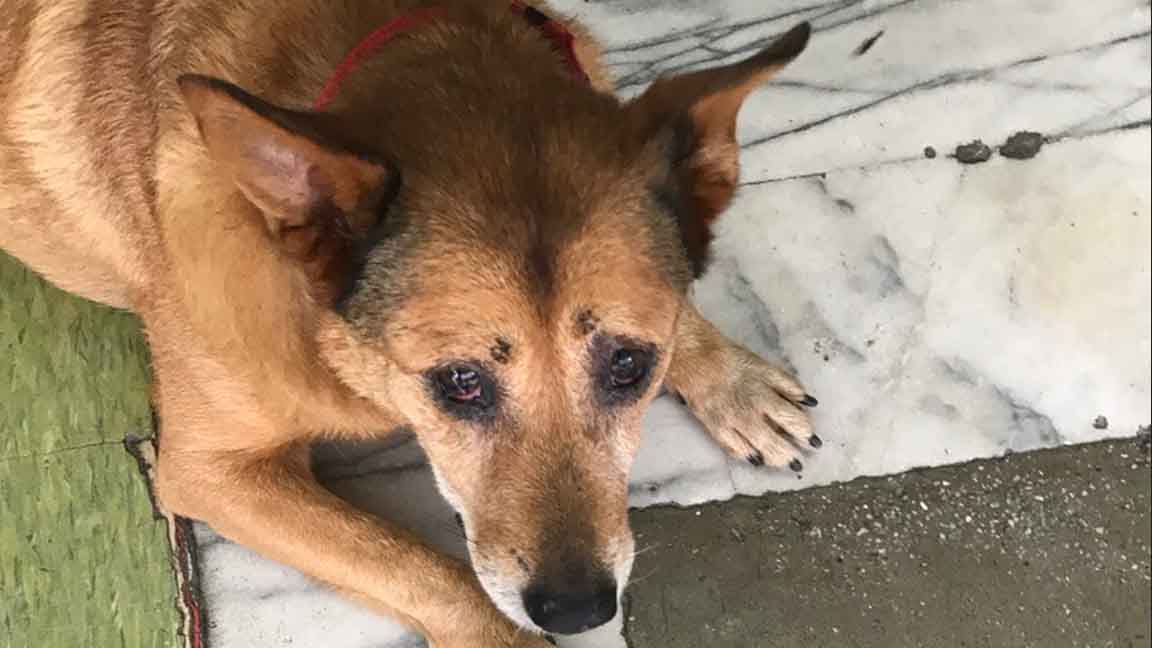I FIRST MET Wang Wang—the dog that lived in my building—in the elevator shortly after I moved in a few years ago. She wandered in to the elevator alone, that day. Since, being a dog, she couldn’t control which floor to go to, I wasn’t sure where to send her. Once I got off on my own floor, I sent her back to the ground floor.
Later I met Wang Wang’s owner, as well, an older woman in her 70s whom I usually called Auntie. She noticed that Wang Wang seemed to like me—rubbing her head against my leg affectionately and refusing to leave, so that Auntie had to drag her off. I began chatting with her whenever we crossed paths, usually when she was walking Wang Wang.

Auntie began to call me “Big Brother” when speaking to Wang Wang, as a pet owner might refer to themselves in relation to a pet. “Big brother is back!” she would say to Wang Wang, whenever we ran into each other. Wang Wang was always quite excitable.
I didn’t always understand what she was saying—she was primarily a Taiwanese Hokkien speaker, and sometimes she didn’t seem to get what was being said in Mandarin. Bangka, the district of Taipei I live in, is the oldest and most historic district; it’s where the city started, even if development moved elsewhere many years ago, leaving Bangka the city’s poorest district.
Bangka is reflective of class differences that took root in authoritarian times, in which the benshengren majority population, from prior waves of Han migration to Taiwan, were forbidden to speak Taiwanese Hokkien and treated as an underclass. Bangka is the only majority Taiwanese Hokkien-speaking district in Taipei. It seemed possible that Auntie was a lifelong resident.
The building I live in is a strange one. The majority of my neighbors are elderly–even now that I’ve lived there for many years, when they see me, a young person, in the building elevator or lobby, their temptation is to stare. Others of my neighbors are gangsters; I’m sometimes woken up by a police loudspeaker ordering someone out of their apartment during their periodic raids on the building. I also live near a series of massage parlors and karaoke places that offer sexual services, so I know that some of my neighbors are sex workers.
Once I was stopped by the police in a random search, around the beginning of Covid, when police were particularly intent on hunting down “runaway” migrant workers. Prejudiced commentary at the time suggested that migrant workers were more susceptible to Covid and more prone to spread it, particularly after the development of clusters of infection among migrant workers employed at factories in rural Miaoli. When the police officer—who seemed rather young and inexperienced—checked my background and learned that I was a journalist, he was surprised to learn which building I lived in. “It’s a mess there!” he exclaimed, and told me that I should be careful.
I have had some odd encounters. A few days ago, I took a short clip on my phone of some birds perched on a sign across the street from my place, and two gangster bros on scooters suddenly pulled up, cornered me, and demanded to know why I was filming them. I told them I was videotaping some birds, which they didn’t believe until I showed them the footage. They flipped through my phone and just found photos of local animals or odd garbage.
They apologized after that and left. I see them standing across the street sometimes when I leave the building. They seem to be lookouts for some of the gangster establishments nearby. “Great,” I thought to myself one day when I spotted them, “Now they know where I live.”
For the most part, though, I find neighborhood just full of harmless old people. I’ve had all manner of strange conversations with them.
Auntie once told me that Wang Wang could speak. She claimed that Wang Wang once said “Big brother” to a scooter shop owner down the street. The scooter shop owner had, in turn, rewarded her with a red envelope with a small sum of money, as one might give to a child. Well, she could say her own name at least—Wang Wang (旺旺) is a homonym with the sound for barking in Mandarin (汪汪).
Another old man liked to talk about his Hakka ancestry, the Hakka being a Han minority group—a group that has sometimes been persecuted, known as a migrant people for being forced to move from place to place. I first ran into him during Ghost Month.
“I’m from Meinong!” he said to me, apropos of nothing, in the elevator. Meinong was a Hakka-heavy district in southern Taiwan. “My family has been in Meinong for hundreds of years. It’s not like Taipei…”
“What?!” he said next. “You’re Hakka, too?” The funny thing is, I actually am Hakka, but I hadn’t said a word to indicate that I was or wasn’t. “We Hakka…” he started. That was when the elevator arrived at my floor. I told him I would see him next time and wished him a good night. Nearly every time I’ve encountered the man since then, he’s usually repeated some version of the same spiel.
Through the years, I often played with Wang Wang whenever I ran into her. During the summer, she would usually sleep in a stairwell on the side of the building. I tried to bring her treats sometimes, though she wasn’t always interested. Occasionally she would follow me after I’d played with her. The first time she did that, I wasn’t sure if she was free to move around on her own, so I dragged her back to the stairwell and ran away. Afterward, I realized that she was always wandering around on her own.
Wang Wang seemed to know many of the building residents, who would sometimes greet her as she passed by. A teacher living in the building would also sometimes help take care of her. Especially during the summer, Auntie or the teacher would usually wash Wang Wang off around 5 p.m. and midnight, because of the heat. Wang Wang had a number of colorful outfits to wear during the winter, which were apparently purchased by the teacher.

I learned that Wang Wang was originally a stray, having been taken in by Auntie as a one-year-old. She was now around 13. Her eyes were always red, since an angry neighbor had once beaten her. I could never understand how someone could treat a dog that way.
As time went on, I realized that Wang Wang’s health seemed to be getting worse and worse. She started urinating in the building lobby, for example. I accidentally stepped in her shit once while doing the laundry (in Taiwan, it’s a superstition that you should buy a lottery ticket immediately after stepping in dog shit, but I didn’t bother—I just went and bought a new pair of sandals instead).
Eventually, Wang Wang didn’t seem to be able to walk with her hind legs anymore. She had apparently fallen. Auntie and the teacher would have to use a towel to hoist Wang Wang by the hindquarters. Sometimes I tried to help out. Not long after, I was a bit shaken to run into Auntie, who was in a state and started talking about how she was considering euthanizing Wang Wang. That worried me. For a few months after that, I didn’t run into Wang Wang or Auntie at all.
When I eventually ran into Auntie, she told me that Wang Wang had passed away. I had gathered that, I said, from not having seeing her for awhile. The cause of death? As Auntie put it, suicide. Wang Wang had swallowed some nails and a fish hook by mistake. Though she and the teacher had taken her to the hospital and paid for a surgery, it was to no avail. The animal hospital had provided some of the treatment for free, since Auntie was short on money, and because they had taken care of Wang Wang since she had first been taken in.
We talked for half an hour. It occurred to me that this was the longest Mandarin conversation I had ever had with Auntie. In the course of this, it became clear that Auntie—who seemed to have no children of her own—thought of Wang Wang as her daughter. She was devoutly Buddhist, you see, so she believed that Wang Wang had formerly been a human but had been condemned to be a dog for thirteen years.
Auntie said that before Wang Wang passed away, she had closed Wang Wang’s eyes and told her to relax—that she should go to Guanyin Pusa, the goddess of mercy, and that her sins were now cleansed from being a dog. But then she also told Wang Wang that she should close her mouth, because it was unbecoming for a girl to go to Heaven with her mouth hanging agape like an idiot.
She then said that while kowtowing to Guanyin Pusa next to Wang Wang, she suddenly blanked out and saw a vision. I didn’t totally get this part, but it seems that she saw Wang Wang as a human girl, with long white sleeves and a shaved head like a monk. A plaque pinned to the side of her clothes said, “Wang Wang,” indicating who it was. She said that the vision had been shown to her by Guanyin Pusa so she would know that Wang Wang had been saved.
I guess pets serve as substitutes for children. Young people, who often can’t afford to have children of their own, seem often to get pets instead. Pets are even referred to sometimes as “Fur Children” (毛孩子). Some people wheel their pets around in pet strollers. For many of the poor elderly people living in the city, too, pets serve as family. Auntie told me she’d asked the teacher to make a photoshopped image of Wang Wang resembling that vision. But then she got very agitated about how she was angry with him, because the teacher had gotten some of the details of the vision wrong, such as the religious pose that Wang Wang’s hands (paws?) were in. As for me, I really wanted to know what this dog-human photoshopped image looked like.
During the conversation, some other building residents would pass by and Auntie would start talking to them about Wang Wang too. By the end, she was crying. I was crying, too, frankly. I decided to end the conversation with an excuse about needing to take a phone call once she started yelling at the teacher about the photoshopped image, though. She seemed as though she were getting too agitated, which I didn’t think was good for her health.
Brian Hioe is the publisher of No Man is an Island, a fellow member of The Brick House Cooperative.






